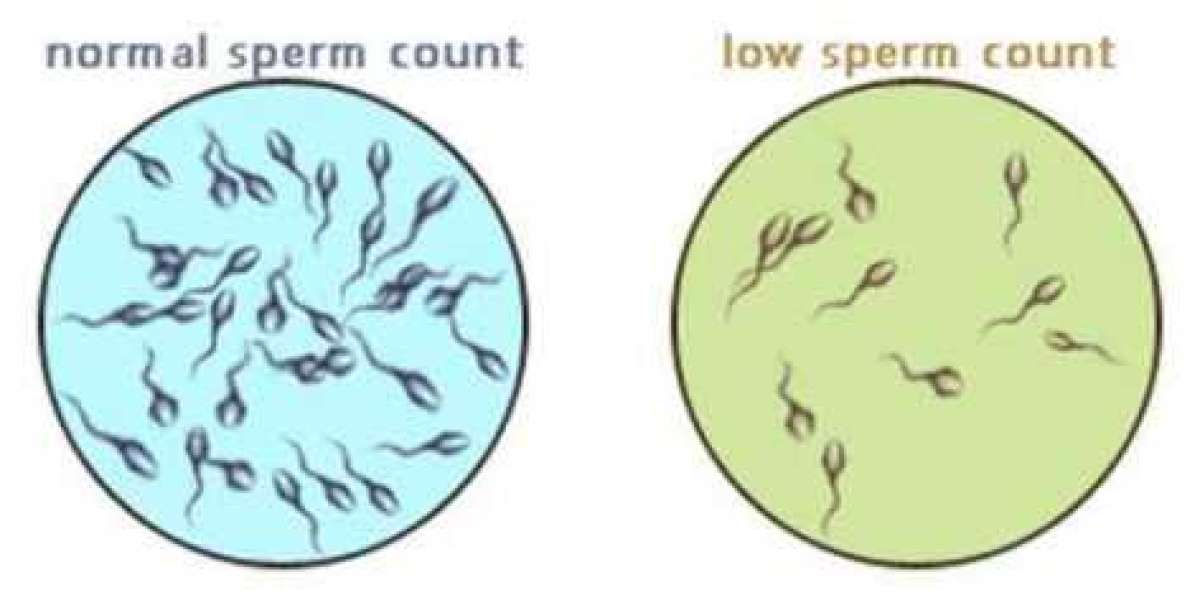Low sperm count, also known as oligospermia, is a common condition that affects many men. It occurs when the semen produced during ejaculation contains fewer sperm than is considered normal, which can make it difficult for a man to father a child.
Causes of Low Sperm Count
There are various causes of low sperm count, including
- Varicocele:
Varicocele is a condition in which the veins in the scrotum become enlarged and can interfere with blood flow and affect sperm production. This is the most common cause of low sperm count and affects up to 40% of men with fertility problems.
- Hormonal Imbalances:
Hormonal imbalances can affect sperm production. Low levels of testosterone, follicle-stimulating hormone (FSH), or luteinizing hormone (LH) can all cause a decrease in sperm production.
- Infections:
Infections in the male reproductive system can also affect sperm production. Sexually transmitted infections, such as chlamydia and gonorrhea, can cause inflammation and scarring in the reproductive tract, which can lead to low sperm count.
- Environmental Factors:
Exposure to certain environmental factors can also affect sperm production. Exposure to pesticides, heavy metals, and radiation can all decrease sperm count.
- Medications:
Certain medications, such as chemotherapy drugs and testosterone replacement therapy, can also affect sperm production and lead to low sperm count.
- Genetic Factors:
Genetic factors can also play a role in low sperm count. Chromosomal abnormalities, such as Klinefelter syndrome, can affect the number and quality of sperm.
- Lifestyle Factors:
Certain lifestyle factors can also affect sperm production. Excessive alcohol consumption, smoking, and drug use can all lead to low sperm count. Additionally, wearing tight clothing or spending too much time in hot environments, such as saunas or hot tubs, can also affect sperm production.
- Age:
As men age, their sperm count and quality may decrease, which can lead to difficulty conceiving.
Symptoms of Low Sperm Count
there may be no obvious symptoms of low sperm count, and the only way to diagnose it is through a semen analysis. However, in some cases, there may be some signs and symptoms that can indicate a low sperm count.
Here are some of the common symptoms of low sperm count.
- Difficulty in Conceiving:
One of the primary symptoms of low sperm count is difficulty in conceiving a child. When a man has a low sperm count, there are fewer sperm available to fertilize the female egg, which can make it more difficult to conceive. If a couple has been trying to conceive for more than a year without success, it is recommended that they seek medical help.
- Changes in Sexual Function:
Low sperm count can also affect sexual function in some men. They may experience a decrease in sex drive or difficulty getting or maintaining an erection. This can be due to hormonal imbalances that are responsible for sperm production. In some cases, this can also lead to problems with ejaculation, including a decrease in the volume of semen.
- Pain or Swelling in the Testicles:
In some cases, a man with a low sperm count may experience pain or swelling in the testicles. This can be due to a variety of conditions, including varicocele, which is a condition where the veins in the testicles become enlarged, or an infection of the reproductive organs.
- Reduced Body Hair:
In rare cases, low sperm count can be associated with reduced body hair, including less facial and body hair. This is due to a hormonal imbalance that can affect sperm production.
- Breast Tissue Growth:
In some cases, low sperm count can lead to an increase in breast tissue growth in men, a condition known as gynecomastia. This is due to an imbalance in the hormones that regulate sperm production.
- Low Muscle Mass:
Low sperm count can also be associated with a decrease in muscle mass, which is again due to hormonal imbalances that can affect sperm production.
Diagnosis of Low Sperm Count
Diagnosing low sperm count, or oligospermia, requires a series of tests and evaluations that can help determine the underlying cause of the condition.
Below are the various methods that are used to diagnose low sperm count.
- Medical History and Physical Exam:
The first step in diagnosing low sperm count is a thorough medical history and physical exam. During this process, the doctor will ask the patient about their symptoms, medical history, lifestyle habits, and any medications they are taking. They will also conduct a physical exam, including a testicular exam, to check for any abnormalities.
- Semen Analysis:
The most common test used to diagnose low sperm count is a semen analysis. This test involves collecting a sample of semen and analyzing it in a laboratory. The analysis can provide information on the number of sperm present in the semen, their shape and size, and their motility (ability to move). A low sperm count is typically diagnosed when the semen analysis shows less than 15 million sperm per milliliter of semen.
- Hormone Testing:
If the semen analysis suggests a low sperm count, the doctor may also order hormone testing to check for imbalances in the hormones that regulate sperm production. This may involve a blood test to measure levels of testosterone, follicle-stimulating hormone (FSH), and luteinizing hormone (LH).
- Genetic Testing:
In some cases, low sperm count may be due to genetic factors. Genetic testing may be recommended if there is a family history of infertility or if the semen analysis suggests abnormalities in the sperm. Genetic testing can help identify any genetic conditions that may be affecting sperm production.
- Imaging Tests:
In some cases, imaging tests such as ultrasound or magnetic resonance imaging (MRI) may be recommended to evaluate the reproductive organs and check for any abnormalities or blockages in the male reproductive system.
- Biopsy:
In rare cases, a biopsy of the testicle may be recommended to evaluate sperm production. This involves removing a small sample of tissue from the testicle and examining it under a microscope to determine if sperm are being produced.
Treatment for Low Sperm Count
The treatment for low sperm count, or oligospermia, depends on the underlying cause of the condition. In some cases, lifestyle changes may be recommended, while in other cases, medical treatments may be necessary.
Here are the various treatment options for low sperm count.
- Lifestyle Changes:
Making certain lifestyle changes can help improve sperm count and overall reproductive health. These may include:
Maintaining a healthy weight: Being overweight or obese can affect hormone levels and decrease sperm production. Losing weight can help improve fertility.
Avoiding tobacco and drugs: Smoking, using drugs, and excessive alcohol consumption can all negatively affect sperm production.
Eating a healthy diet: A diet rich in fruits, vegetables, whole grains, and lean protein can help improve overall reproductive health.
Reducing stress: Chronic stress can affect hormone levels and decrease sperm production. Finding ways to reduce stress, such as meditation or yoga, may help improve fertility.
- Medical Treatments:
If lifestyle changes do not improve sperm count, medical treatments may be recommended. These may include:
Medications: Certain medications, such as clomiphene citrate and gonadotropins, can help stimulate sperm production.
Surgery: In cases where there is a blockage or obstruction in the male reproductive system, surgery may be necessary to remove the blockage and improve sperm production.
Assisted Reproductive Technologies (ART): ART methods, such as intrauterine insemination (IUI) and in vitro fertilization (IVF), may be recommended for couples who are having difficulty conceiving due to low sperm count. These methods involve fertilizing the female egg with the male sperm outside of the body and then transferring the fertilized egg to the uterus.
- Alternative Treatments:
There are some alternative treatments that may be recommended to improve sperm count, although the evidence for their effectiveness is limited. These may include:
Acupuncture: Some studies suggest that acupuncture may help improve sperm count and motility.
Herbal Supplements: Certain herbal supplements, such as ginseng and maca root, may help improve sperm count and overall reproductive health.
Short Story
Title: The Miracle Cure for Low Sperm Count
Mark and his wife, Sarah, had been trying to conceive for over two years with no success. After numerous visits to the doctor, they received the devastating news that Mark had a low sperm count, which meant that they may never be able to have children of their own.
Mark was devastated. He felt like he had let his wife down and he was ashamed of his condition. He didn't want anyone to know, not even his closest friends.
One day, Mark received a surprise visit from his childhood friend, Alex. They hadn't seen each other in years, but Alex had heard about Mark's struggle to conceive and decided to pay him a visit.
As they caught up, Mark eventually confided in Alex about his low sperm count. To his surprise, Alex had experienced the same issue a few years prior, but he had found a solution.
Alex shared his story with Mark. He had traveled to a remote village in India, where he had met a wise old man who had taught him about the healing powers of a rare herb. This herb had cured Alex's low sperm count, and he was now the proud father of two healthy children.
At first, Mark was skeptical. But as he thought about it, he realized that he had nothing to lose. With Sarah's encouragement, Mark decided to travel to India to meet the wise old man and try the miracle cure.
After a long and challenging journey, Mark finally arrived at the remote village. He met the wise old man, who shared the secret of the rare herb with him. Mark consumed the herb as instructed, and after a few weeks, he started to notice changes in his body.
Upon returning home, Mark and Sarah eagerly waited to see if the miracle cure had worked. To their surprise and delight, Sarah became pregnant within just a few months.
Mark was overjoyed. He had finally overcome his low sperm count and was going to be a father. He couldn't wait to meet his child and share the story of the miracle cure with them.
The news of the miracle cure quickly spread, and soon, men from all over the world were traveling to the remote village in India to try the rare herb. It had become a popular and sought-after solution for low sperm count.
Mark and Alex had become heroes to many men who were struggling with infertility. They had discovered a miracle cure that had changed their lives forever.
Conclusion
Low sperm count is a common condition that can be caused by a variety of factors. By adopting a healthier lifestyle, making dietary changes, exercising regularly, taking medications, and, in some cases, undergoing surgery, it is possible to increase sperm count and improve the chances of fathering a child. It is important to speak to a doctor if you suspect you may have a low sperm count to receive an accurate diagnosis and appropriate treatment plan.




Emmanuel Frank 1 Y
Awesome